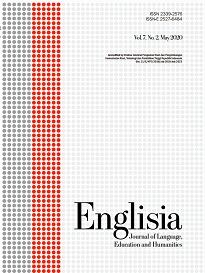Strategies used by Indonesian high school English teachers to improve students' reading comprehension: A qualitative study
DOI:
https://doi.org/10.22373/ej.v12i1.22830Keywords:
English reading, English teaching, Reading difficultiesAbstract
Reading comprehension is essential in ESL/EFL teaching, yet many students in Indonesia face difficulties in comprehending English passages. This study aims to investigate the strategies used by English language teachers to address these challenges. The research problem focuses on identifying effective strategies to improve students' reading comprehension skills. A qualitative research method was used, involving semi-structured interviews with four high school English teachers in Indonesia who were purposively selected. Data were collected in January 2024 through interviews conducted at different times and locations. The data were analyzed thematically to identify recurring challenges and effective strategies. The findings revealed that teachers faced significant barriers, such as students' limited vocabulary and difficulties with long texts. To address these issues, teachers used strategies such as selecting passages based on students' interests, using skimming and scanning techniques to quickly identify key ideas and specific information, and using mind mapping to help students organize and understand complex information. In conclusion, the study highlighted the importance of adaptive teaching methods in overcoming reading comprehension challenges. The suggested strategies - interest-based texts, skimming, scanning and mind mapping - were found to be effective in improving students' reading skills. Further research is recommended to investigate the long-term effects of these strategies and to develop additional methods for improving reading comprehension.
Downloads
Downloads
Published
Issue
Section
License
Proposed Policy for Journals That Offer Open Access
Authors who publish with Englisia journal agree to the following terms:
- Authors retain copyright and grant the journal right of first publication with the work simultaneously licensed under a Creative Commons Attribution License that allows others to share the work with an acknowledgement of the work's authorship and initial publication in this journal.
- Authors are able to enter into separate, additional contractual arrangements for the non-exclusive distribution of the journal's published version of the work (e.g., post it to an institutional repository or publish it in a book), with an acknowledgement of its initial publication in this journal.
- Authors are permitted and encouraged to post their work online (e.g., in institutional repositories or on their website) prior to and during the submission process, as it can lead to productive exchanges, as well as earlier and greater citation of published work (See The Effect of Open Access).









